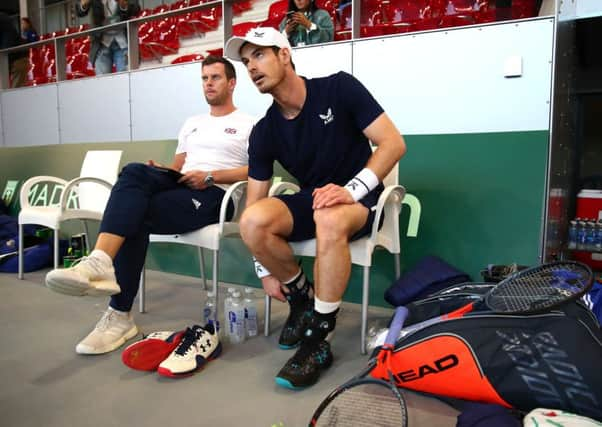Leon Smith: Andy Murray’s a superstar but he doesn’t act like one


Four years ago, the lynchpin of the side was Andy Murray. Today, nine months on from hip resurfacing surgery and just over 10 months on from apparently bidding a tearful farewell to the sport he loves, Murray is again the centre of attention. Even a couple of months ago, Murray was unsure what to expect from himself as he began his singles comeback but now, as the winner of the Antwerp trophy just last month, he is ready for national service once more. And for Smith, that is the best news any captain could have.
“You’re bringing in someone that’s a grand slam winner, Davis Cup winner, Olympic gold winner, former No 1,” Smith said. “You have a player who’s achieved a hell of a lot in the game but there’s no ego. There’s confidence of course, but there’s no ego with Andy.
Advertisement
Hide AdAdvertisement
Hide Ad“When he comes in everyone gets a huge boost. Yes, he’s a superstar but he doesn’t act like a superstar, he’s just one of the guys. If he has to be the one that’s practising – it’s a very good bubble court – but if it’s on the bubble court, there’s no issue. ‘I don’t need to have the stadium court, I don’t need to have the best times to get massaged’. He’s a normal guy that just loves doing what he’s doing, he’s back in the team with his friends and that’s it. It’s a really great situation to be in.”
The squad – the Murray brothers, Kyle Edmund, Dan Evans and Neal Skupski – is a tight knit group. All but Skupski were in Ghent on that historic weekend when Britain beat Belgium in 2015 but even the rookie of the group feels at home with his new teammates. He grew up playing with Evans, he has trained with Edmund and, since June, he has been Jamie’s regular doubles partner. The only man he did not know was Andy – but that relationship has taken no time at all to gel.
“The more and more I get to know him, he’s very relaxed, very chilled out,” Skupski said. “He doesn’t mind taking the mick but that’s what you get in a team environment. It’s all good fun at the end of the day.”
It is not just Andy’s on-court efforts that make Smith’s job easier; it is what the younger Murray brings to the team room that can make a huge difference.
“OK the friendship and the fun is always going to be there,” Smith said, “but when you start talking about things, when you start talking about his matches and the experience he talks about – when he’s talking about things, that could be previous matches or situations he’s been in, someone giving over that experience to other players is priceless isn’t it? It’s having someone in the team that can pass on an awful lot.”
The new format for the finals has brought 18 teams to the Caja Magica (the Magic Box) in the Spanish capital.
Split into six groups of three, each team will play two group matches: two singles and a doubles over the best-of-three sets.
The winners of each group and the two best runners up will qualify for the quarter-finals. The runners-up will be decided on sets and games won – so every match and every set counts in the group stages, no matter the overall score in the rubber. The doubles, then, are crucial in the opening rounds.
Advertisement
Hide AdAdvertisement
Hide Ad“It’s potentially more important,” Jamie, pictured left, said, “because obviously it’s two rubbers to win the tie but, equally, especially in the latter stages it might not get played if the singles is 2-0. But all deciding rubbers will be doubles rubbers so, if you’re playing, you’re playing because it means something.”
Andy’s ranking – No 126 – means that he is lowest ranked of the team’s three singles players, so he must play as Britain’s No 2 singles player. In the new format, that will pit him against the No 2 of the Netherlands (Tallon Griekspoor, the world No 179, who has never played the Scot before) and Kazakhstan (Mikhail Kukushkin, the world No 67 who has lost four times on the bounce to Murray) in the group stage. In theory, that is a point as good as banked in each match.
“Obviously, it’s great for us to have Andy playing,” Jamie said, “that’s always going to increase our chances of doing well against whoever we play.
“It’s obviously a big advantage for us that he’s playing at number two in this competition, so hopefully we can use that to our advantage but there’ll be a lot of tough matches.”
As for the Murray brothers joining forces in the doubles, that will be decided on a day-by-day basis. At the moment, Jamie and Skupski are hard at work on the practice court and waiting for the captain’s call.
“We just have to wait and see what happens,” Jamie said. “It depends on how Andy’s feeling physically, what’s the best set-up for the team on that day.
“But Neal and I have practised all week and we’re ready to play if called upon and I hope we’ll do a good job for the team.”